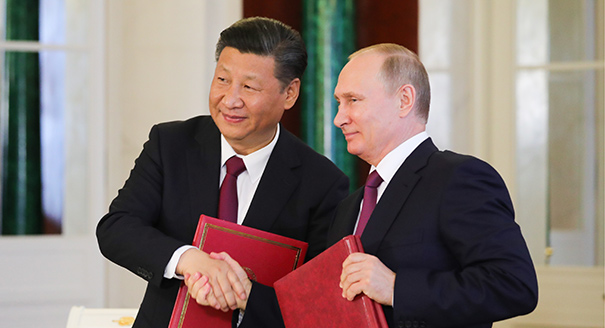Xi Jinping’s visit to Moscow at the beginning of July laid bare the fact that Russia has already collected all the low-hanging fruit from its friendship with China, a relationship that deepened after the onset of the Ukraine crisis and the imposition of Western sanctions on Moscow. Russian-Chinese relations since the annexation of Crimea have been marked by large contracts such as the Power of Siberia natural gas pipeline, arms deals, generous Chinese investment, and loans from Beijing for the Yamal LNG and Sibur projects.
Aside from their commercial viability, these projects owe their success to geopolitics and the personal interest of Vladimir Putin and Xi Jinping. This is one of the reasons why the Russian elite remains skeptical about cooperation with China: not everyone has benefited from Russia’s “pivot to the East”; state-run enterprises and businessmen with longtime connections to Vladimir Putin have received most of the fruits of this pivot.
But the era of large-scale Russian-Chinese projects is drawing to a close. All major deals that could have been made have already been concluded; further initiatives either can’t be embarked upon in the current economic climate or will require a large amount of work. The Power of Siberia 2 pipeline, for example, won’t be constructed as long as gas prices remain low, and there has been no progress on the Moscow-Kazan high-speed railway.
The absence of new, large-scale projects doesn’t mean that cooperation with China has been put on hold. For the first time in many years, Russia has deliberately tried to develop the infrastructure of its economic diplomacy in the Asia-Pacific, which is arguably the most important accomplishment of its pivot. Increases in trade and mutual investment didn’t only result from large-scale projects and high oil and gas prices, but also from the attention that the Russian government and business community has been paying to Asia.
Predictably, the China craze has led to some administrative chaos. The number of intergovernmental panels on cooperation with China has gone up from three to five in the last three years, for example. Many of the panels are redundant and don’t coordinate their work, and there is considerable redundancy at the ministerial level as well. What’s more, the government still isn’t taking China scholarship seriously, and a lack of financing is thwarting attempts to introduce analytical support for Russian economic diplomacy in the Asia-Pacific.
In the absence of large-scale joint projects going forward, the success of Russian business cooperation with China will be increasingly dependent on technical management and governance. Enhancing relations will require diligent efforts to reduce non-tariff barriers and establish a free trade zone between the two countries. Russia also needs to work on improving its investment climate in order to attract Chinese investors. Finally, it has to develop expertise that will serve both government and business needs.
In order to do so, Russia must overhaul the bureaucratic structures involved in its relationship with China reducing the number of intergovernmental panels and removing duplication of their functions; a company with an energy investment project in the Far East should not have to go through four government panels and multiple ministries to push its initiative through.
As it stands, Russian businesses are not organized enough to be able to lobby for their interests in China. There is no Russian equivalent of the European Chamber of Commerce in China, which represents EU companies before Chinese regulators and is one of the most powerful lobbying groups in the country. Nothing is stopping the Russian business community from learning from the EU’s success.
Existing business groups could also work more effectively. The Russia-China Business Council (RCBC) isn’t even remotely as efficient as its counterparts among China’s main trade partners. Additionally, it would be quite easy to develop more regular informal communication with Chinese business leaders, which U.S., EU, Japanese, and Australian business leaders enjoy.
Creating publicly accessible analytical digests on China and other Asia-Pacific countries would be another good investment, as domestic expertise provides a useful resource for the business community.
Finally, a sizeable presence in the Chinese market will be impossible without the establishment of a free trade zone. Ongoing trade agreement negotiations between China and the EAEU notwithstanding, the emergence of a full-fledged free trade zone is still a long way in the future. However, at present, only a handful of people in Russia are capable of conducting such negotiations. Therefore, it would make sense to expand the Global Education Program to train trade negotiators. It is also possible to train negotiators within the framework of the EAEU, with the help of Kazakhstan’s Boloshak program.
These measures would be relatively inexpensive to implement, but they won’t yield quick results—that’s why now that Chinese investment has all but dried up, Moscow risks turning its attention away from Asia. Once again, Russia may miss the opportunity to profit from one of the world’s largest markets—and an especially important one for Russia in light of continuing Western sanctions.
